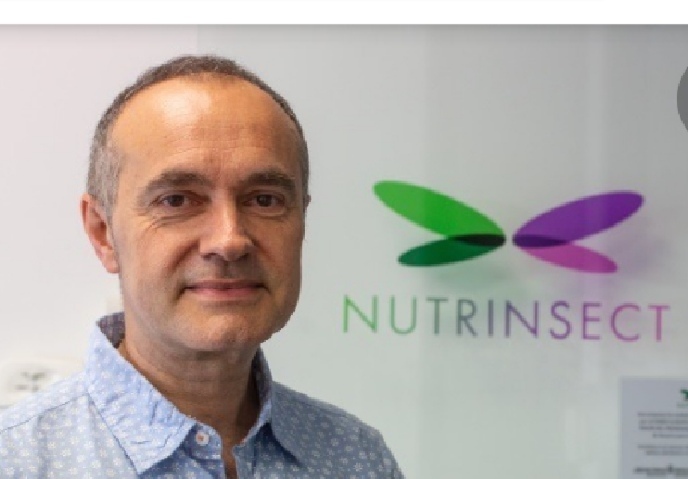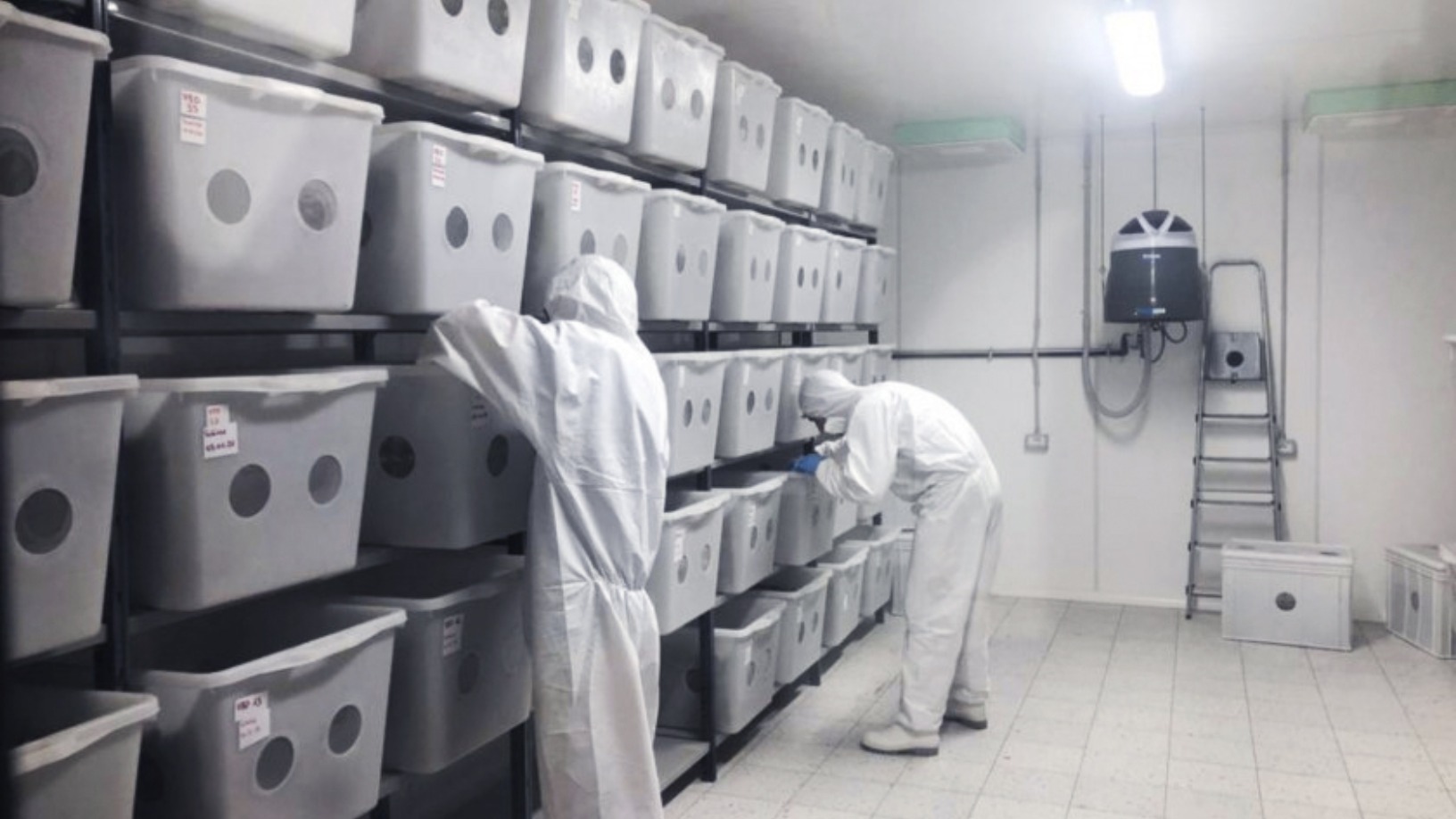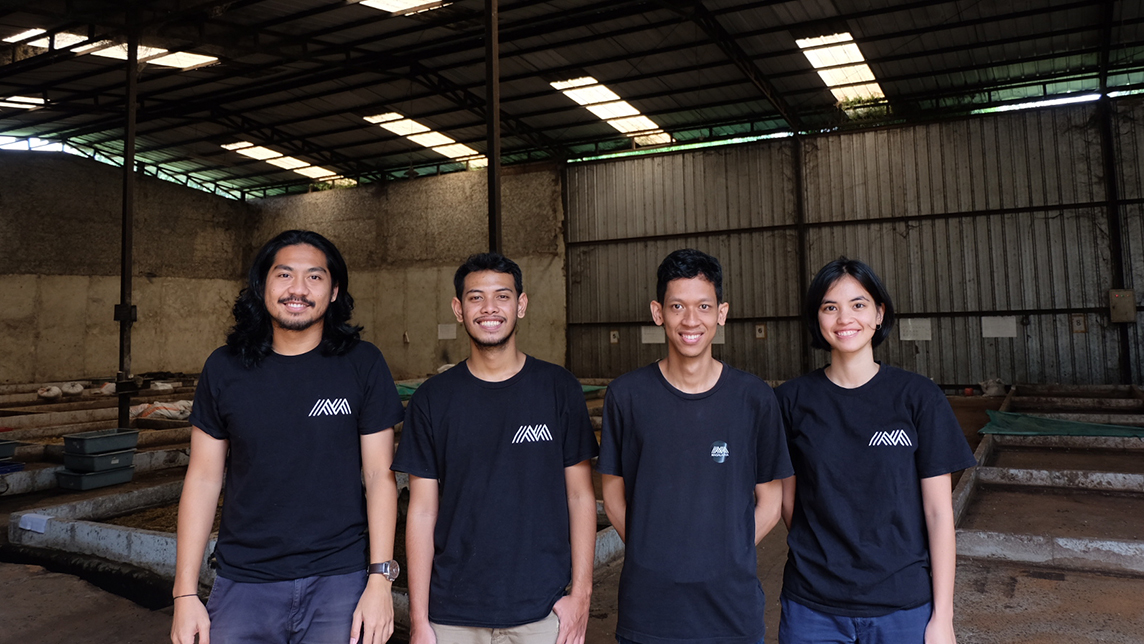Insects are part of the local diet for many people across Southeast Asia, Africa and Central America, but most westerners recoil at the idea of consuming critters. And so the founders of Italo-Spanish startup Nutrinsect reckon that turning crickets into flour for use in bread and pasta would be an easier product to swallow than cricket crisps.
The startup is farming crickets as an alternative protein. The world needs more sustainable sources of protein than meat, says Nutrinsect’s CEO and CFO for Spain and co-founder José Vidal Obón, and insects is one of the alternative sources scientists often recommend.
“My co-founders and I had already been thinking of starting a business and one day we saw a report from the UN's Food and Agriculture Organization (FAO) stating the world population would reach almost 10bn by 2050. By then, overconsumption of the world's resources would make it harder to feed the global population," Vidal told CompassList via Skype, as he recalled how the partners got the idea of farming insects for food as a business.
“The food industry constantly needs to innovate so it is always looking for novel food," he added, noting that insects are not only high in protein, they are also "a far more sustainable raw ingredient which would fulfill the corporate social responsibility pledges of large food producers.”
But as the thought of eating insects is still unpalatable for most consumers, “the idea is not to sell whole insects, but to sell the flour for use in bread, cookies, pasta, energy bars or anything with a flour-base. The taste is neutral. If you have bread made with cricket flour, you won't be able to tell the difference.”
Countries are struggling to meet the huge demand for meat, putting unsustainable pressure on land and water resources. Rainforest deforestation is directly attributed to increased cattle production, with both cattle and sheep requiring one hectare to feed just one person. Moreover, the amount of meat consumed globally is projected to rise by 44% from 2018 to 453m tons in 2030, creating a potential environmental crisis.
With insects touted as a key source of alternative protein, the market for insect farming has ballooned in the recent years and investors are betting on even greater growth ahead. Just this month, French startup Ynsect raised $224m as part of a Series C funding totaling $372m.
More environmentally friendly than soy
“Every day, 2.2bn people eat insects" across the world, said Vidal. "Those people also travel and their eating habits travel, too. The Western mentality today may put up a cultural wall against considering insects as food, but globalization means that in one generation or two it will happen.”
Nutrinsect, which participated in this year’s Smart Agrifood Summit in Malaga, Spain, does not for the moment produce insects for human consumption but produces flour made from insects – crickets, to be precise. The insects’ high protein content means that they are used as an ingredient for pet food because dogs and cats, numbering over 850m worldwide, are also major consumers of protein.
“European legislation that came out at the end of 2015 allows consumption of insects only as a raw material for animal feed,” said Vidal. “So our idea was to keep insects and convert them into a protein flour for hard pet food.
Nutrinsect was founded in 2016, right after European legislation in 2015 approved the large-scale production of insects for consumption as a raw material in animal feed.
"The European legislation stipulates seven types of insect from the fly, worm and cricket family. We chose the latter because in terms of protein content it’s the one that has the best nutritional profile." Vidal said.
“One hundred grams of cricket flour contains 70% protein. Currently, the protein flour that is most commonly used is soy, which has 30-35g of protein per 100g – so insects have practically double of that. Now, 80% of soy produced is genetically modified, plus you need large areas of land and a lot of water to produce it. Insects, however, consume minimal resources.”

Circular economy model
Keeping insects requires bio-secure conditions where full protective lab gear must be worn and a constant temperature and humidity maintained. As each cricket weighs on average 0.35g and contains a large proportion of water, “to obtain tons of protein powder, you need millions of crickets and you need space to keep them,” said Vidal. “The advantage is they can be kept vertically on different shelves as in a logistics warehouse and it's relatively easy to scale the business.”
Nutrinsect's first farm opened in January 2020 in the small central Italian town of Montecassiano and provides vertical storage with a total of 700 square meters for insect keeping. The protein flour is also produced on-site. First, the crickets are harvested at the end of their lifecycle of approximately 60 days, during which time they have already laid eggs in their storage units to be collected by the Nutrinsect team. “We create different generations of cricket so that we can always have a constant supply and keep, say, 100,000 out of one million for reproduction. The rest are killed and turned into flour,” said the co-founder.
Crickets are converted into a 100% organic flour by heating the dead insects inside a microwave to dehydrate them and then they are pulverized into a powder. No other ingredients are added. Heating is performed at an undisclosed temperature to conserve all the nutritive properties of the protein. The insects are killed previous to the heating process by gradual refrigeration that lowers their metabolic rate until the body shuts down.
Besides the powder designed to form a major ingredient of dog and cat food pellets, Nutrinsect also produces a second 100% organic product, fertilizer, at no extra cost, ensuring no waste and with an entirely sustainable circular economy model.
“Waste in food production is a big problem but not in insect keeping," said Vidal. “Our insects consume biowaste from the local food industry and act as biotransformers, converting all their waste into a valuable organic fertilizer. This is made up of leftover insect food, excrement, shed skin and dead insects that fall to the floor before harvesting. The cages are designed so that all the waste falling is collected every one or two days with a removable floor. The result is ready-to-use fertilizer suitable for all agriculture: fruit trees, cereals, flowers or for public parks.”
A high-value product
Though Italy's strict Covid-19 lockdown has meant that the company has only been in production for four months to date, Nutrinsect sells its fertilizer locally to farms and has been sending samples of its flour to small-to-mid-size pet food manufacturers in Italy, Germany, the UK, Switzerland and Spain, from where the first small orders are coming in. Prices are €130 per kg at present, but will drop as the company reaches industrial-scale production.
“This is a product where you can't look only at the price because, for example, you can pay €600 per ton of soy flour and probably double that amount for a ton of insect powder,” said Vidal. “But cricket protein content is double soy's so you only have to buy half the amount to get the same level of nutrition. Plus, insect flour, unlike soy, is entirely sustainable.”
Nutrinsect intends to produce 1,000kg of flour each month in 2021 and to reach 10,000 kg per month in 2023 – an industrial-scale requiring automated production. This will require opening a seed investment round for €3m–5m beforehand, said Vidal.
To date, the startup has got by on FFF funding of €90,000 and, in early 2020, the receipt of €350,000 from the regional private business organization where Montecassiano is located, Fondazione Marche, to support the six-strong team. The company is also currently seeking €250,000 to open an insect farm at its Spanish base in Navarre. It has secured 60% of the capital.
For humans, next?
Besides Vidal, previously a finance manager and a Spanish national, the other two co-founders of Nutrinsect are a pair of Italian brothers: former sports and finance manager Jose Cianni, who is the company’s CEO and CFO for Italy, and Robert, an insurance executive who is Head of Sales. None had any prior knowledge or experience of insect farming prior to Nutrinsect's initial founding in Italy or had even considered it until they knew about the FAO's warning on upcoming food security issues.
The company then approached a Spanish government research body, the Centro Superior de Investigaciones Cientificas, which began advising the company. As the project developed, Nutrinsect entered collaboration agreements in 2017 with Spain's National Food Institute and the University of Navarre for technical expertise, as well as founding the Spanish branch of the company in the Navarre town of Tudela.
In that same year, the company began at agritech incubator The Hive in Ancona and completed acceleration in Navarre's agritech accelerator Orizon T, where they filled in their missing knowledge gaps about the sector. They also employed a full-time biologist.
The ultimate aim for Nutrinsect is to assist in and supply the conversion of Europeans to insect consumption. To this end, it is making contacts anticipating future demand once existing gray areas preventing European consumption are ironed out.
“The European Commission issued a list of novel foods including insects but the real go-ahead for human consumption requires permission from the relevant health authority and that is what we are waiting for,” said Vidal.















